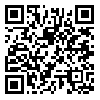Volume 25, Issue 12 (3-2019)
RJMS 2019, 25(12): 8-16 |
Back to browse issues page
Download citation:
BibTeX | RIS | EndNote | Medlars | ProCite | Reference Manager | RefWorks
Send citation to:



BibTeX | RIS | EndNote | Medlars | ProCite | Reference Manager | RefWorks
Send citation to:
Chamani A, Gaeini A, Nuri R, Kordi M R, Choobineh S. The effects of six-week small-sided soccer games on telomere length and TRF2 gene expression in the middle-age males. RJMS 2019; 25 (12) :8-16
URL: http://rjms.iums.ac.ir/article-1-5376-en.html
URL: http://rjms.iums.ac.ir/article-1-5376-en.html
1- University of Tehran, Tehran, Iran, Tehran University - Kish Campus
2- University of Tehran, Tehran, Iran, University of Tehran, Faculty of Physical Education and Sport Sciences ,aagaeini@ut.ac.ir
3- University of Tehran, Tehran, Iran, University of Tehran, Faculty of Physical Education and Sport Sciences
2- University of Tehran, Tehran, Iran, University of Tehran, Faculty of Physical Education and Sport Sciences ,
3- University of Tehran, Tehran, Iran, University of Tehran, Faculty of Physical Education and Sport Sciences
Abstract: (4605 Views)
Background: Because the length of leukocyte telomeres can be used as a biomarker to detect cell longevity and predict mortality and cell disease, recently, many people have been interested in examining the effects of exercise on telomere lengths. Protecting the length of human telomeres definitely depends on TRF2 as one of the subunits of the shelterin protein complex. The present study intends to investigate the effects of six-week Small Sided Games on telomere length and TRF2 gene expression in the middle-aged males.
Methods: A semi-experimental design was employed to investigate this issue in the present study. The subjects were selected from a statistical population of men between the ages of 35 and 41. There was a control group and an experimental group. The experimental group played soccer in small fields, according to the exercise protocol, for six weeks, with two 45-minute sessions per week. Real time PCR was used to measure the length of the telomeres and TRF2 gene expression, the fat percentage was measured by the caliper and the VO2max by the Rockport Field Test. The data were analyzed through using SPSS software version 25 that was used to obtain independent t-test with significant level of p<0.05.
Results: The present study indicated that there was a significant change in the Fat percentage, VO2max and TRF2 gene expression following six weeks of Small Sided Games (p˂0.05) yet no significant change was observed in telomere length (p˃0.05).
Conclusion: It seems that the play of soccer in small fields does not affect the length of telomere in the middle-aged males, but it affects the expression of their 2TRF gene. So cautiously, this kind of exercise is effective in protecting middle-aged people's chromosomes.
Methods: A semi-experimental design was employed to investigate this issue in the present study. The subjects were selected from a statistical population of men between the ages of 35 and 41. There was a control group and an experimental group. The experimental group played soccer in small fields, according to the exercise protocol, for six weeks, with two 45-minute sessions per week. Real time PCR was used to measure the length of the telomeres and TRF2 gene expression, the fat percentage was measured by the caliper and the VO2max by the Rockport Field Test. The data were analyzed through using SPSS software version 25 that was used to obtain independent t-test with significant level of p<0.05.
Results: The present study indicated that there was a significant change in the Fat percentage, VO2max and TRF2 gene expression following six weeks of Small Sided Games (p˂0.05) yet no significant change was observed in telomere length (p˃0.05).
Conclusion: It seems that the play of soccer in small fields does not affect the length of telomere in the middle-aged males, but it affects the expression of their 2TRF gene. So cautiously, this kind of exercise is effective in protecting middle-aged people's chromosomes.
Type of Study: Research |
Subject:
Exercise Physiology
Send email to the article author







